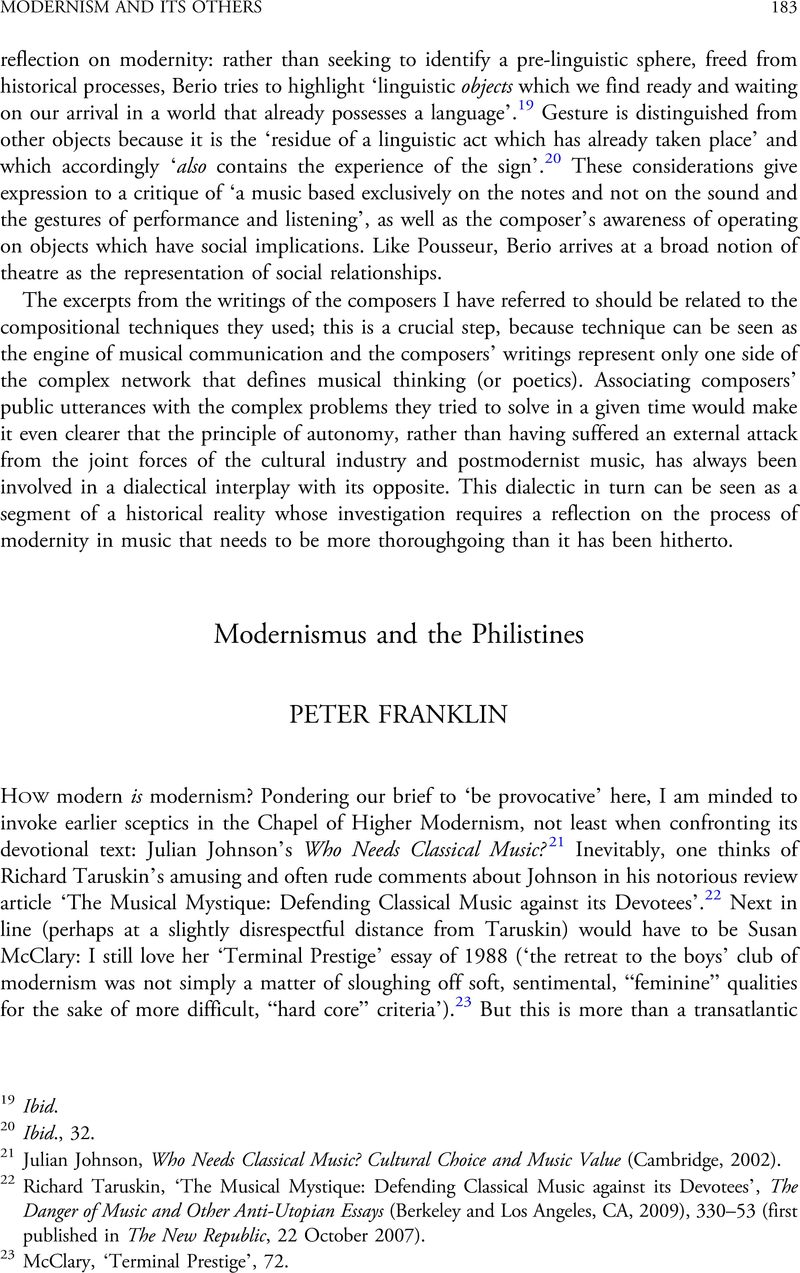Published online by Cambridge University Press: 01 January 2020

21 Julian Johnson, Who Needs Classical Music? Cultural Choice and Music Value (Cambridge, 2002).
22 Richard Taruskin, ‘The Musical Mystique: Defending Classical Music against its Devotees’, The Danger of Music and Other Anti-Utopian Essays (Berkeley and Los Angeles, CA, 2009), 330–53 (first published in The New Republic, 22 October 2007).
23 McClary, ‘Terminal Prestige’, 72.
24 E. T. A. Hoffmann, ‘Beethoven's Instrumental Music’ (1813), Strunk's Source Readings in Music History, rev. edn, gen. ed. Leo Treitler, 7 vols. (New York and London, 1998), vi: The Nineteenth Century, ed. Ruth A. Solie, 151–6 (all quotations here from pp. 152–3).
25 David Beard and Kenneth Gloag, Musicology: The Key Concepts (London and New York, 2005), 3.
26 E. T. A. Hoffmann, Tales of Hoffmann, selected and ed. R. J. Hollingdale (London, 1982), 127–57 (p. 127); the quotations in the following paragraph are from p. 136.
27 Robert Schumann, ‘Florestan's Shrove Tuesday Address Delivered after a Performance of Beethoven's Last Symphony’, Strunk's Source Readings in Music History, vi, ed. Solie, 104–6.
28 I refer to John Carey, The Intellectuals and the Masses: Pride and Prejudice among the Literary Intelligentsia 1880–1939 (London, 1992).
29 ‘Second Interlude: The Society of Musical Private Performances’ (from the society's prospectus, written by Alban Berg); see Willi Reich, Alban Berg, trans. Cornelius Cardew (New York, 1974), 46–9.
30 Pierre Boulez, ‘Possibly’ (originally ‘Éventuellement’, 1952), Stocktakings from an Apprenticeship (Oxford, 1991), 111–40 (p. 113).
31 Theodor W. Adorno, ‘The Aging of the New Music’ (1955), trans. Susan Gillespie, in Adorno, Essays on Music, ed. Richard Leppert (Berkeley and Los Angeles, CA, 2002), 181–202 (p. 181).
32 Specific references are to Mark Carroll, Music and Ideology in Cold War Europe (Cambridge, 2003); Heather Wiebe, Britten's Unquiet Pasts: Sound and Memory in Postwar Reconstruction (Cambridge, 2012); Nadine Hubbs, The Queer Composition of America's Sound: Gay Modernists, American Music and National Identity (Berkeley and Los Angeles, CA, 2004); David Osmond-Smith and Paul Attinello, ‘Gay Darmstadt: Flamboyance and Rigour at the Summer Courses for New Music’, Contemporary Music Review, 26 (2007), 105–14.
33 Guy Dammann, review of Mark Simpson, A Mirror-Fragment, BBCSO/Brabbins, The Guardian, 22 April 2013, 24.
34 Johnson, Who Needs Classical Music?, 130.